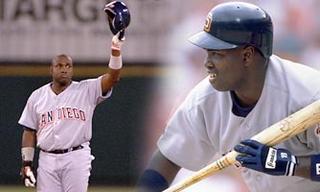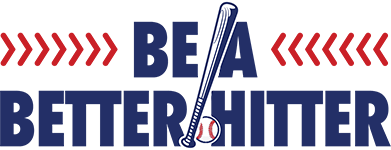Professional Hitting Tips

Tips from the Pros
Cal Ripken, Sr: The Ideal Hitter
The ideal hitter would probably have a combination of these qualities: strength, determination, coordination, confidence, vision, rhythm, style, body control, quick hands, and the will to learn and to take advice. The following is a list of batting tips that can help anyone become a better hitter.
Select a bat you can handle.
Learn the strike zone – don’t swing at bad pitches.
Keep your front shoulder and chin tucked in, and your hands back. Turn your head so that both eyes are on the pitcher – don’t look around your nose. Stay on the balls of your feet – keep off your heels. Keep your head still.
In order to get the bat started, move your hands back slightly as the pitcher is getting ready to release the ball. If you like the pitch, go ahead and hit it. If you don’t like the pitch, then hold up your swing.
Take a short step and stride – a long stride will only throw you off balance.
Stay on top of the ball. A slight downward swing allows this and is a good way to keep from upper-cutting. Keeping the front shoulder in and down also allows a hitter to get the bat head out in front and prevents dropping the back shoulder.
Learn to hit your strength. Every hitter has a strength just as every hitter has a weakness. Hit your pitch. When you get it, don’t let it get away. Concentrate on solid, hard contact.
Mike Piazza: Fundamentals of Batting
In 1997, Mike hit .362, the highest batting average for a catcher in more than 50 years, and racked up a slugging percentage of .638. With 40 homers, 124 RBIs, 104 runs, and 201 hits, Piazza had the greatest offensive season of any catcher in the more than 100 years. Here are some of Mike’s baseball batting tips:
Look for a good pitch to hit.
Have a quick bat.
Stay inside of the ball so you can hit the ball to all fields.
Try to spread your feet a little wider than shoulder width for balance.
Hold your bat at a 45-degree angle to alleviate unnecessary movement in your swing.
Keep your back elbow close to your body to help your hands and the barrel of the bat swing through the ball.
Have someone watch you while you swing and check your mechanics.
Tony Gwynn: Tee for One

For me the most effective way to practice hitting is to use a batting tee and a bag of wiffle balls. Tee it up and start hacking. The sooner you can hit a wiffle ball cleanly off a tee, the sooner you will become a better hitter. When you hit a wiffle ball off a tee correctly, it acts like a knuckleball. You can hear the air going through the ball. When you don’t hit it correctly, you create spin on the ball and it goes all over the place. When the ball spins alot, I make adjustments to correct my swing. Even after 18 years in the big leagues, every winter I go home and break out the tee and wiffle balls. It’s not the most exciting thing, so you have to be creative. I put my headphones on and listen to my favorite music while I concentrate on my hitting technique.
Andre Dawson: Hitting Philosophy
“I never considered myself a home run hitter,” says Andre Dawson. “I had quick hands, a quick bat, and the ball would jump off my bat. But I always liked to focus on hitting for average.”
Be patient and selective.
Try to avoid the temptation to be overly aggressive and simply focus on putting the ball in play.
Try to use the entire playing field.
Do not be afraid to wait on the ball.
Approach the plate with a plan in mind. Think thoroughly about what you are trying to do, but try not to force anything.
Manny Mota: Approaching the Plate
Concentration, rhythm, and purpose are some of the most important aspects to hitting, according to legendary Dodgers outfielder Manny Mota. “Hitters should take short strides and use quick hands,” he said. “Taking a short stride actually helps your hands be quicker. It keeps your swing compact and under control.”
The most valuable advice that I can give a young hitter is to think about hitting the ball up the middle. If you think about hitting up the middle, you can adjust to hit the ball wherever it is pitched. If you go to the plate hoping to pull the ball and hit a home run, you will have trouble hitting an outside pitch. Your front side will have already opened up and you will not be able to drive an outside pitch.
Concentration at the plate is critical, and positive thinking helps. You have to walk up to the plate saying to yourself, “I’m going to hit the ball”.
You have to have balance in everything that you do in baseball, especially in hitting. Your body is going to move, but you must keep your head still. The only way to do that is to have good balance.
A hitter needs rhythm. Try to watch the pitcher’s hand and keep your eye on the ball.
Be aggressive at the plate, but also remain loose and relaxed. If you let your arms get too tight, you will lose the advantage of having good wrist action, as well as your power.
If you find yourself in a slump, try to concentrate on defense and possibly save the game with a good play. Slumping hitters should remember that it does not always take a home run to help the team.
You should have a purpose to each swing in batting practice. In your first round of batting practice you might concentrate on hitting every pitch to the opposite field. In the next round, try to make sure that you are swinging down on the ball. Prepare yourself for game situations, or the practice will not be as helpful as it could be.
